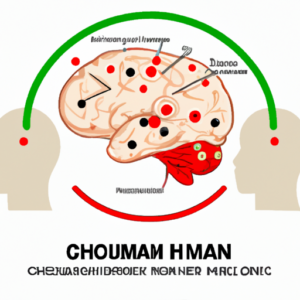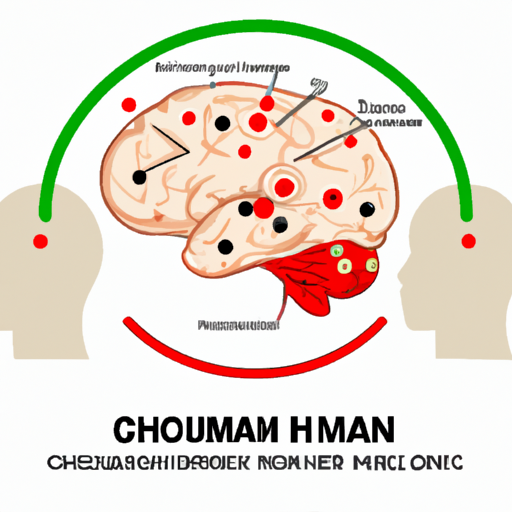Let’s Get Clucking: An Introduction to Chicken Pox
Hey there, folks. Welcome to my blog devoted to chicken pox. You might be asking, “Why chicken pox?” Well, let me tell you. As someone who has suffered from this disease, I know first-hand how miserable it can be. And if that’s not enough, did you know chicken pox can actually affect your brain? That’s right, and we’re going to explore the topic in this post. So sit back, relax, and let’s get clucking!
Why the Chicken Pox Can Mess with Your Brain
Hey there, have you ever wondered why the chicken pox can affect your brain? Well, as someone who has had chicken pox, I can tell you firsthand that the virus can cause some serious issues with your noggin. Here’s why:
When you get chicken pox, the virus not only infects your skin, but it can also travel to your brain and cause inflammation. This inflammation can lead to some pretty scary symptoms, like seizures, loss of consciousness, and even coma. And the worst part is, brain involvement with chicken pox is more common than you might think.
But why does this happen? Well, it all comes down to how the virus spreads. You see, chicken pox is a highly contagious disease that spreads through the air or by touching infected items. Once the virus enters your body, it can travel through your bloodstream and infect various organs, including your brain.
Additionally, people with weakened immune systems are at a higher risk for brain involvement with chicken pox. This includes infants, elderly individuals, and people with certain medical conditions. Plus, if you get chicken pox as an adult, you’re more likely to experience severe symptoms, including brain inflammation.

If you or someone you know is experiencing symptoms of brain involvement with chicken pox, it’s important to seek medical attention immediately. This can help prevent long-term damage to the brain and improve the chances of a full recovery.
In the next section, we’ll discuss some common symptoms of brain involvement with chicken pox to help you recognize the signs and take action if necessary.
Chicken Pox and Your Brain: Here are the Symptoms
It’s not just an itchy rash that makes chicken pox a pain—it can sometimes affect the brain too. Symptoms of brain involvement with chicken pox are not that common, but they can be severe.
One of the first signs of brain involvement is a headache that is more severe than usual. You may also experience a stiff neck, dizziness, or a high fever that lasts for several days. If the virus spreads to the brain, it can cause seizures, confusion, and even a coma.
Another sign that chicken pox may be affecting your brain is a change in mental status. You may find yourself feeling lethargic, disoriented, or even hallucinating. These symptoms can be especially concerning if you have a weak immune system, are very young, or are elderly.
If you notice any of these symptoms, it’s critical to seek immediate medical care. Chicken pox can affect the brain with little warning, and early treatment can help prevent potentially serious complications.
The Lasting Impacts of Chickenpox on the Brain
Hey there, folks, it’s me again, your friendly neighborhood writer bringing you the scoop on chickenpox’s long-term effects on the brain. As you may already know, chickenpox is a highly contagious viral infection that most people get in childhood. While it usually resolves without complications, chickenpox can sometimes lead to severe brain involvement and, in some cases, enduring damage to the nervous system.
Brain involvement with chickenpox occurs when the virus spreads from its primary site of infection in the skin to the brain and its surrounding tissues. According to medical experts, the virus reaches the brain through the bloodstream and triggers inflammation in various parts of the nervous system. The result is a wide range of symptoms, from mild cognitive deficits to severe and permanent brain damage.
The symptoms of brain involvement with chickenpox may depend on the severity of the infection. In mild cases, patients may experience headaches, dizziness, and confusion. More severe symptoms may include seizures, tremors, and abnormal movements. In some cases, nerve damage can occur, leading to paralysis, vision loss, and hearing loss. Sadly, some people who suffer from severe brain involvement with chickenpox may never fully recover, leaving them with permanent disabilities that affect their daily lives.
What’s even more troubling is that the long-term effects of chickenpox on the brain may not show up until years after the initial infection. Researchers have found that some patients may experience delayed complications, such as cognitive impairment, chronic fatigue, and depression, long after the chickenpox rash has gone away. While it’s not entirely clear why this happens, medical experts believe that the virus may remain dormant in the nervous system and reactivate later in life, leading to persistent brain inflammation and damage.
So, what can we do to prevent these long-term effects of chickenpox on the brain? Well, the most effective way is to get vaccinated against the virus. The chickenpox vaccine is safe and highly effective in preventing the infection and its complications, including brain involvement. Even if you’ve had chickenpox before, it’s essential to get vaccinated to reduce your risk of reactivation and complications later in life.
All in all, chickenpox is not a harmless childhood disease; it can have lasting and devastating consequences on the brain. While there’s no cure for the damage already done, we can take steps to prevent it from happening in the first place. By getting vaccinated and taking other precautions, we can protect ourselves and our loved ones from the long-term impacts of this infectious disease.
Treatment and Prevention: Don’t Let the Chicken Get You
Now that we’ve talked about how chicken pox can affect the brain, you’re probably wondering how to avoid it all together. Luckily, there are quite a few ways to both treat and prevent chicken pox.
For starters, if you suspect you or someone you know has chicken pox, go see a doctor immediately. They can prescribe antiviral medication, which can help reduce symptoms and speed up recovery time. It’s important to remember that chicken pox is highly contagious, so it’s crucial to stay home and avoid contact with others until you’re completely healed – usually, this takes about two weeks.
Children can be vaccinated against chicken pox with two doses, usually given between 12-15 months and again between 4-6 years old. Adults who have never had chicken pox can also get vaccinated.
If someone in your household has chicken pox, you can help prevent it from spreading by washing your hands frequently, covering up open sores and avoiding contact with the affected individual. Disinfect surfaces regularly with a good cleaning agent to help kill any germs that may be lingering around.
Remember, chicken pox is not something to take lightly. It can cause serious complications, especially when it affects the brain. So, take steps to protect yourself and others by getting vaccinated and avoiding close contact with anyone who may have chicken pox. For more information, you can visit https://brightsidebeauty.com/overview-of-chicken-pox-what-you-need-to-know/.
Conclusions: The Final Word on Chicken Pox and the Brain
Well folks, there you have it – everything you need to know about how chicken pox can affect the brain. But if you’re like me, you like to keep it short and sweet. So here’s what I’ve learned:
Chicken pox is a viral infection that can cause a range of symptoms, from mild to severe. In some cases, it can even affect the brain. Symptoms of brain involvement include seizures, headache, and altered mental status.
The long-term effects of chicken pox on the brain are still being studied, but experts believe that it can increase the risk of neurological disorders, such as encephalitis and meningitis.
The good news is that there are treatments available for chicken pox and its associated brain complications. Antiviral medications can help speed up recovery and prevent complications. Vaccines are also available to prevent chicken pox altogether.
In conclusion, while chicken pox may seem like just a harmless childhood illness, it’s important to be aware of the potential risks and complications. If you or a loved one experience symptoms of brain involvement, seek medical attention immediately. And don’t forget to stay up-to-date on vaccinations – it could save you a lot of hassle in the long run!
